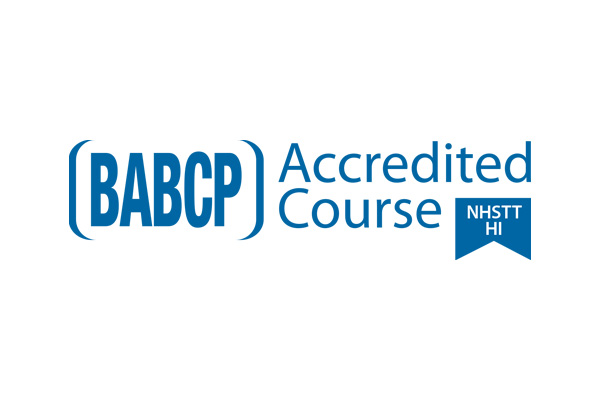Why Choose Lincoln
Teaching from subject specialists
Fully funded by Health Education England
Opportunities to apply learning to clinical settings
Accredited by the BABCP

This course aims to provide comprehensive training in Cognitive Behavioural Therapy (CBT) for common mental health problems, including depression and anxiety disorders, leading to a Post Graduate Diploma in Cognitive Behavioural Psychotherapy. Successful applicants will be trained to deliver high-quality CBT, mainly within the NHS or NHS funded Talking Therapies services (previously known as IAPT), as part of the stepped care approach.
On the course you will have the opportunity to learn about the core theoretical principles of CBT, CBT assessment, and formulation and treatment protocols for a range of anxiety disorders and depression. You can develop the skills to work as an ethical professional therapist across a range of settings.
Trainees need to pass the course in order to continue in employment. Further information and examples of person specifications/job descriptions can be found on the NHS health careers website.
Teaching from subject specialists
Fully funded by Health Education England
Opportunities to apply learning to clinical settings
Accredited by the BABCP

All trainees are employed by either the NHS or by NHS commissioned Talking Therapy Services. The training is made up of a blend of University-based learning (typically two days per week) and placement-based learning (typically three days per week). University-based learning includes face-to-face and online taught sessions and workshops, facilitated by experienced staff accredited by the British Association for Behavioural and Cognitive Psychotherapies and by experts in specialist areas. Teaching typically takes place on Mondays and Tuesdays. The remaining time is spent in clinical practice within the trainee's service, where your experience will be supported by practice-based supervision sessions with professional colleagues.
Your placement experience will be supported by University-based (typically online) clinical supervision sessions. You will also be allocated a personal tutor to support you with any academic related issues.
Trainees will be expected to attend the University of Lincoln two days a week and hold an active caseload working in their Talking Therapies service for the remainder. University is a mix of remote and face-to-face teaching days, and you must be able to commit to 100% of the teaching days.
Trainees need to pass all components of the course in order to continue in employment. Further information and examples of person specifications/job descriptions can be found on the NHS health careers website.
This module focuses on equipping students with the skills to conduct comprehensive CBT assessments. Students can critically engage with the theoretical and research foundations of CBT, developing the ability to evaluate evidence and apply scientific principles to clinical practice.
This module aims to enhance students' proficiency in CBT techniques for anxiety disorders, refining their ability to assess and treat a range of conditions utilising both behavioural and cognitive approaches. Through evidence-based protocols, students can learn to apply tailored interventions that address various anxiety presentations effectively. The module also explores potential treatment adaptations to meet any varied needs of diverse client groups.
This module aims to equip students with the skills to assess and treat a range of depression presentations, using evidence-based cognitive behavioural therapy (CBT) approaches. Both cognitive and behavioural models of depression will be explored, with training in established treatment protocols. The module also examines treatment adaptations to cater to the diverse needs of clients.
Running alongside the first three modules, this module supports students in compiling a professional portfolio and oral case study, that showcases their clinical and academic progress. Through structured reflection and applied learning, students will demonstrate their growth in CBT practice.
† Some courses may offer optional modules. The availability of optional modules may vary from year to year and will be subject to minimum student numbers being achieved. This means that the availability of specific optional modules cannot be guaranteed. Optional module selection may also be affected by staff availability.
We want you to have all the information you need to make an informed decision on where and what you want to study. In addition to the information provided on this course page, our What You Need to Know page offers explanations on key topics including programme validation/revalidation, additional costs, and contact hours.
Alongside the course, trainee CBT therapists will work for the NHS or other contracted talking therapies providers in their related service provision. Students are responsible for their own travel, other associated costs while on placement. Students would also need to be able to travel from their home or place of work to our Brayford Pool Campus, as a mandatory requirement of the course.

This programme is accredited by the British Association for Behavioural and Cognitive Psychotherapies (BABCP).
The programme uses a variety of formative and summative assessment methods aimed at helping you develop and to chart your progression as a therapist, including your theoretical knowledge and clinical skills.
Common assessment methods include Observed Structured Clinical Examinations (OSCEs), role plays, clinical case recordings, reflective reports, case studies, presentations, and the creation of a substantial portfolio indicating clinical and academic experience.
Postgraduate study is an investment in yourself and your future. It can help you to further or completely change your career, develop your knowledge, enhance your salary, or even prepare you to start your own business. Postgraduate students at the University of Lincoln benefit from inspirational teaching combined with high-quality facilities and learning spaces, great industry links, and unique research opportunities, all of which are designed to help you stand out from the crowd and make the most of your time with us.
Applicants that successfully complete the course, will be eligible for practitioner accreditation with the British Association of Behavioural and Cognitive Psychotherapists (BABCP). There are a wide range of exciting career opportunities open to qualified and accredited CBT therapists, and you can find our more information on the NHS career development page.
For any further information not outlined above, please contact hipi@lincoln.ac.uk
Before training in CBT, all applicants must have successfully completed an undergraduate degree (or equivalent credits at level 6), ideally in a mental health/psychology/healthcare subject, to demonstrate the ability to study on an extremely demanding academic postgraduate programme. Applicants must also be able to demonstrate at least two years experience working in mental health setting/s.
More details can be found in the 'Minimum Training Standard' document.
https://babcp.com/Minimum-Training-Standards
Applicants may come from 1 of the following 2 routes. Please note, APEL/APL does not apply to this course.
Core Profession Route:
Candidates from a wide range of registered mental health backgrounds are invited to apply to the course.
Candidates from a core professional background should demonstrate a minimum of two years post-qualification clinical experience.
Please see below for more information on what qualifies as a core profession.
https://babcp.com/Core-Professions
KSA Route:
Candidates without a core profession can also apply for the course through the Knowledge, Skills, and Attitudes (KSA) route. The KSA is a portfolio, required to be complete at the interview stage, which demonstrates how you have equivalent training and experience to someone with a 'core' mental health profession. This widens participation by allowing people to train in CBT using an alternative route.
The KSA portfolio includes meeting a number of criteria. You will find more details in the link below:
https://babcp.com/Knowledge-Skills-Attitudes
Candidates from a non-registered professional background will also need to demonstrate a minimum of two years relevant clinical experience, alongside their ability to meet the relevant criteria outlined in the KSA. This includes candidates who have completed a PG Certificate in Low Intensity Psychological Interventions, who must also have at least two years experience, working as a Psychological Wellbeing Practitioner (PWP) post qualification.
Fees for this programme are fully funded by NHS England (NHSE) (previously HEE), for those applicants who are successful at interview. Trainees will be employed by an NHS or NHS commissioned Talking Therapies Service and must apply through the service, not the university. Jobs are usually advertised on NHS jobs.
Candidates must not be enrolled on any other HEI training or educational programme at the time of training or have received NHSE funding in the previous two years.
Candidates who have previously been enrolled and not completed a funded CBT training course must provide evidence and reference from the previous HEI about extenuating circumstances that led to withdrawal from the course, to demonstrate how further funding would be a good use of public money. Previously funded applicants who have withdrawn without extenuating circumstances, or who have been excluded from/previously failed a CBT course, are not eligible to apply.
Candidates who have already completed a CBT course meeting the BABCP minimum training standards for accreditation are not eligible to apply.
Individuals who have received NHSE funding for an NHS-funded psychological professions training programme, are generally not eligible for further NHS funding for another psychological professions training programme, until at least two years have passed. This two-year period begins after the qualifying examination board has agreed any relevant awards.
This rule also applies to any individual who starts and subsequently completes, withdraws, or fails to complete the qualifying requirements of a training programme
If you would like to know more about this course, please contact hipi@lincoln.ac.uk.
To get a real feel for what it is like to study at the University of Lincoln, we hold a number of dedicated postgraduate events and activities throughout the year for you to take part in.

The PGDip Teaching Team are all highly experienced, qualified, and fully accredited CBT Therapists, all having worked in primary and/or secondary care mental health services. They are also experienced clinical supervisors who can provide high-quality CBT supervision to trainees, as part of the course. During the course, you may also be taught by Associate and Guest Lecturers with involvement from Experts by Experience and previous students.
Teaching will be in line with CBT competencies and the BABCP core curriculum.

We also run an NHS Talking Therapies Supervisor Training course. This course, funded by NHS England, has been created especially for Psychological Wellbeing Practitioners and Cognitive Behavioural Psychotherapists, and could be an exciting next step.